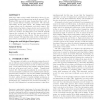Free Online Productivity Tools
i2Speak
i2Symbol
i2OCR
iTex2Img
iWeb2Print
iWeb2Shot
i2Type
iPdf2Split
iPdf2Merge
i2Bopomofo
i2Arabic
i2Style
i2Image
i2PDF
iLatex2Rtf
Sci2ools
112
click to vote
SPAA
2009
ACM
2009
ACM
On avoiding spare aborts in transactional memory
This paper takes a step toward developing a theory for understanding aborts in transactional memory systems (TMs). Existing TMs may abort many transactions that could, in fact, commit without violating correctness. We call such unnecessary aborts spare aborts. We classify what kinds of spare aborts can be eliminated, and which cannot. We further study what kinds of spare aborts can be avoided efficiently. Specifically, we show that some unnecessary aborts cannot be avoided, and that there is an inherent tradeoff between the overhead of a TM and the extent to which it reduces the number of spare aborts. We also present an efficient example TM algorithm that avoids certain kinds of spare aborts, and analyze its properties and performance. Categories and Subject Descriptors
Related Content
| Added | 25 Nov 2009 |
| Updated | 25 Nov 2009 |
| Type | Conference |
| Year | 2009 |
| Where | SPAA |
| Authors | Idit Keidar, Dmitri Perelman |
Comments (0)

